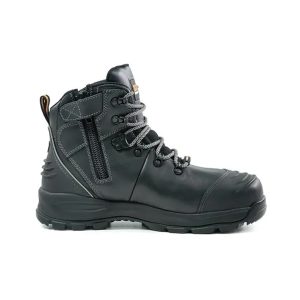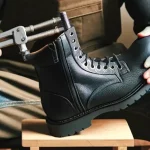497,300 experienced a work-related illness or injury during the 2021-22 financial year.
While nothing can prevent workplace injuries entirely, the proper safety gear can help reduce your chance of getting hurt on the job.
When it comes down to composite toe vs steel toe boots, it can depend on your trade. Our experts have helped thousands of people across many different trades find the most suitable footwear option for them. That’s why we have put this guide together to help you choose the safety boots that are right for you.
What is the Difference Between Steel Toe and Composite Toe Boots?
Steel toe boots have a metal cap, offering high protection, especially from heavy impacts, but are bulky and less insulating. They’re traditionally used in construction and similar fields. Composite toe boots, made of non-metal materials like carbon fibre, are lighter, non-conductive, and non-magnetic, benefiting electricians and workers needing to pass metal detectors. However, they offer less protection than steel toe variants.
Composite Toe vs Steel Toe Boots
| Feature | Steel Toe Boots | Composite Toe Boots |
|---|---|---|
| Toe Cap Material | Metal (steel) | Non-metallic (carbon fibre, Kevlar) |
| Protection Level | High impact and puncture resistance | Lesser impact protection compared to steel toe |
| Weight and Bulk | Bulkier and heavier | Lightweight |
| Insulation | Varies with design, generally limited due to metal’s conductive nature | Varies with design, potentially better due to non-conductive materials |
| Special Features | Suitable for heavy industrial environments | Non-conductive, non-magnetic, suitable around electricity and metal detectors |
Pros and Cons of Composite Boots
Pros
- Lightweight, especially compared to steel cap boots
- Generally more comfortable than steel toe boots
- High electrical resistance since they do not conduct electricity
- Higher thermal insulation, making them ideal for colder work environments
- Stays cooler in higher temperatures
- Do not set off metal detectors
Cons
- More expensive to produce than steel toe boots, meaning a higher price tag for the consumer
- Average resistance to punctures
- Less ability to withstand force compared to steel capped boots
- Can weaken with impact due to compression and become less protective over time
- Less versatile (with a thicker, bulkier toe cap, composite materials are limited to certain styles)
Pros and Cons of Steel Toe Boots
Pros
- More resistant to puncture
- They do not shatter or snap
- Higher protection, offering improved safety in environments with heavy equipment or heavy items at risk of falling
- High durability, so they do not weaken or offer reduced protection over time
- Less expensive than composite toe capped boots
- Display some degree of electrical resistance (however, composite toe boots are considered the safer option if you work around a high
- risk of electrical shock)
Cons
Steel caps weigh more than composite materials, making steel toe boots heavier and more prone to causing fatigue in workers who walk a lot
Can set off metal detectors, causing inconvenience for workers who regularly pass through metal detectors
Poor insulation (cold feet in the colder months and hot feet during summer)
Examples
We put together a couple of example scenarios to illustrate how different safety boots perform in the workplace.
Construction Worker
Environment: Jack’s site often has heavy machinery and materials. The risk of objects falling on feet is high.
Footwear Choice: Jack opts for steel toe boots.
Outcome: One day, a heavy tool accidentally drops on his foot. Thanks to the steel toe cap, which can withstand significant weight and impact, his foot is protected from serious injury.
Electrician
Environment: Sarah’s workplace has high electrical risks and requires passing through metal detectors daily.
Footwear Choice: Sarah chooses composite toe boots.
Outcome: During maintenance, she accidentally steps on a live wire. The non-conductive nature of her composite toe boots protects her from electrical shock. Additionally, her boots don’t trigger metal detectors, making her daily security checks hassle-free.
Key Takeaways
- General Protection: Steel toe boots offer higher impact and puncture resistance, ideal for heavy industrial environments. Composite toe boots provide adequate protection but less than steel toe boots.
- Material and Weight: Steel toe boots have a metal cap, making them heavier and bulkier. Composite toe boots use non-metallic materials like carbon fibre, resulting in a lighter boot.
- Insulation and Comfort: Steel toe boots generally offer limited insulation. Composite toe boots often have better insulation and are more comfortable due to their lighter weight.
- Special Features: Composite toe boots are non-conductive and non-magnetic, suitable for electricians and environments with metal detectors. Steel toe boots are more durable but can set off metal detectors.
- Cost and Durability: Steel toe boots are usually less expensive and more durable over time. Composite toe boots, while more expensive, provide high electrical resistance and stay cooler in higher temperatures.
- Workplace Suitability: Steel toe boots are preferable in environments with a high risk of heavy falling objects. Composite toe boots are advantageous in jobs involving electricity or frequent passage through metal detectors.
FAQs
What are steel toe boots?
Steel toe boots feature a reinforced cap made from metal that sits above the toe area. This curved metal cap offers a high level of protection for your toes in the event of a heavy object falling on your feet.
Steel caps offer higher protection and resistance to punctures than composite toe capped boots. However, they are generally bulkier and provide minimal insulation.
What are composite toe boots?
As with steel toe boots, composite safety toe boots feature a reinforced toe area to provide protection against falling objects in the workplace. However, composite toe caps are constructed from metal-free materials, such as carbon fibre or Kevlar.
Along with being more lightweight than steel toe boots, composite toe capped boots do not conduct electricity. This makes them ideal for workers who deal with live electrical circuits or are at a high risk of electrical shock, such as electricians or nuclear plant workers.
Composite toe boots do not have magnetic properties, meaning workers can pass through metal detectors without interruption. Although they are lightweight and sturdy, composite toe caps do not offer the same degree of protection as steel toe boots.
How do I choose between steel toe vs composite toe?
Choosing between composite boots vs steel toe boots comes down to your workplace environment, work duties, and personal preference.
We often recommend steel toe boots for individuals who work around forklifts, heavy equipment, nails, or heavy materials that are at risk of falling or rolling.
For workers who deal with electrical risks, we recommend looking into composite boots.
We suggest asking yourself these questions to help decide which safety footwear will offer you the protection you need:
- Do I work around heavy machinery?
- What boots are my coworkers wearing?
- Do I work around a lot of electricity?
- Do I work around heavy objects that may fall on my feet?
- Do I have to pass through metal detectors often?
- What level of protection do I prefer?
- What capabilities do I want your boots to have?
- Do I work in extreme temperatures?
How long do steel toe safety boots last?
There is no set time limit on how long steel toe or composite safety boots will last. It depends on the quality of the boot, wear time, and your work environment.
We recommend checking your safety boots regularly for excessive wear and tear. If you feel they are lacking protection or showing signs of damage, it may be time to look for a replacement safety boot.
We find that safety boots that are exposed to harsh work environments and long hours typically need to be replaced after about a year or so.
Regular maintenance can help your work boots last as long as possible. See our guide on How to Clean Work Boots for tips on keeping your safety boots in good condition.
How do I stretch new work boots?
If you have new steel toe or composite toe boots that feel a bit too snug, check out our guide here for tips on How to Stretch Work Boots.
Are steel toe boots heavier?
Yes, steel toe boots are generally heavier than a standard work boot or composite toe boot. If you spend long days on your feet or your job involves a lot of walking, you may want to consider composite toe cap boots.
Will steel toe boots cut off my toes?
We’ve heard this myth a lot but steel toe boots will not shatter or snap and amputate your toes.





































